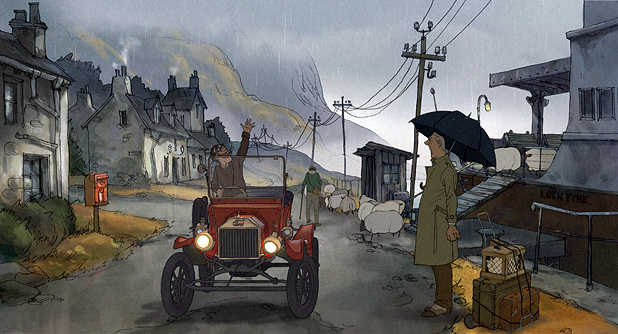The Illusionist
PG2003 saw the release of the animated Belleville Rendez-Vous, directed by Sylvain Chomet. It was a glorious slap in the face to modern animated features, paying homage to a classic, hand-drawn style of animation, accompanied by the jazziest of soundtracks.
The Illusionist then, is Chometís follow-up project, continuing with the use of the same stylish method of animation.
Itís the late fifties in Paris, and an illusionist is feeling the full brunt of change. His act of sleight of hand magic, pulling a rabbit out of a hat etc. just isnít what the public want. Pop music is knocking loudly on the door, and everyone is in a hurry to let it in.
He decides to take his show on the road, and travels to London. However, this capital is also under the spell of the invasion of pop, so he decides to go elsewhere. He arrives in Scotland, where initially at least, his cabaret act is still appreciated. In a small village, he captivates one young girl in particular, who is so taken by his talent, she decides to follow him to his next location Ė Edinburgh.
It is there that their relationship develops, into a father and daughter scenario. However, Although a long way away from London, Edinburgh soon finds itself adapting to its communityís shift in cultural appetite, leaving the illusionist once again no longer flavour of the month. Itís then that he realises that he has to accept some changes of his own.

Hello sir, fancy a ride in Chitty Chitty Bang Bang? I've even got some boiled sweets too!
Although the animation style may be familiar, this has very little else in common with Belleville Rendez-Vous. Its script, for instance, was written by legendary French actor/director Jacques Tati, and was only recently unearthed by his daughter Sophie Tatischeff. She felt that if anyone could bring her late fatherís vision to life, Chomet could.
Chomet has clearly remained faithful to the script; it is a beautiful interpretation of not only a relationship between a father and daughter, but also a swansong to vaudeville. What it also is, somewhat unintentionally, is an allegory for this style of animation. With Pixar and their kind generating animated features in super-duper computers, Chomet has produced yet another love letter to animated films of a bygone age.
Where this one differs dramatically from Belleville Rendez-Vous, is that Chomet almost presents it as a live-action feature. Thereís a natural approach in its representation of not only the environment, but in also dealing with its characters emotions. The problem is that as the characters only express themselves in a sort of Simmish language, the film is essentially a silent film. This means that the animated characters are left to almost act and emote like their human counterparts would.
With the animation left to do all of the donkey work, it has none of the flair or imagination that Belleville was brimming with. Itís charming and quaint, but suffers terribly from pacing issues. The story just drags on for far too long, with long periods where very little of anything happens.
As Belleville proved so beautifully, an animated feature doesnít have to be powered by the pixel; what Chomet has produced this time however is a film that would have benefited from being a live-action feature, no doubt starring the great Tati himself.
As is stands, compared to the marvellous Belleville Rendez-Vous, The Illusionist simply under performs and just doesnít have the same kind of magic.
